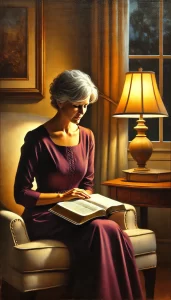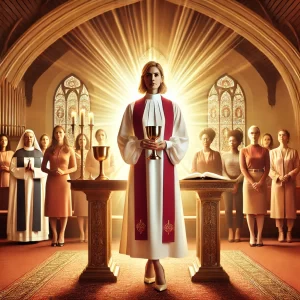 When I think about my journey as a woman advocating for equality in the church, I often come back to a single question: how could the voices of women—so evident in the Bible—be dismissed in today’s religious leadership? Growing up, I never questioned why the priest at the altar was always a man. It was simply the way things were. But as I delved deeper into my faith and studied scripture, I began to see a different story, one filled with women who led, prophesied, and were vital to God’s work.
When I think about my journey as a woman advocating for equality in the church, I often come back to a single question: how could the voices of women—so evident in the Bible—be dismissed in today’s religious leadership? Growing up, I never questioned why the priest at the altar was always a man. It was simply the way things were. But as I delved deeper into my faith and studied scripture, I began to see a different story, one filled with women who led, prophesied, and were vital to God’s work.
I couldn’t ignore the contradictions. On one hand, the church taught that God created men and women equal, but on the other, women were excluded from priesthood. It was a contradiction that didn’t sit right with me, and it became clear that the issue wasn’t with God’s design but with human tradition.
Biblical Foundations: Women in Leadership
Old Testament Context
In the Old Testament, the priesthood was limited to the male descendants of Aaron, creating a tradition of male-centric religious leadership. However, women like Miriam, Deborah, and Huldah played vital roles as prophets and leaders. Deborah, for instance, was both a prophet and judge who led Israel during a time of crisis, exemplifying women’s capacity for spiritual and civic leadership (Judges 4:4–5). These examples challenge the notion of a strictly patriarchal divine order.
religious leadership. However, women like Miriam, Deborah, and Huldah played vital roles as prophets and leaders. Deborah, for instance, was both a prophet and judge who led Israel during a time of crisis, exemplifying women’s capacity for spiritual and civic leadership (Judges 4:4–5). These examples challenge the notion of a strictly patriarchal divine order.
New Testament Developments
The New Testament reveals a more inclusive approach. Jesus broke societal norms by including women among His followers, such as Mary Magdalene, who was the first to witness and proclaim His resurrection (John 20:17–18). The early church also recognized women like Phoebe, a deacon, and Junia, described as “outstanding among the apostles” (Romans 16:7).
However, some Pauline texts, such as 1 Corinthians 14:34–35, appear to restrict women’s roles in public worship, creating theological tension. These passages have been interpreted in various ways, from cultural instructions for a specific time to universal mandates for church order.
Modern Interpretations and Theological Debates
The ambiguity of biblical texts has led to divergent interpretations among Christian denominations:
- Support for Ordination
- Advocates for women’s ordination argue that the Bible emphasizes equality in Christ, citing Galatians 3:28: “There is neither Jew nor Greek, slave nor free, male nor female, for you are all one in Christ Jesus.”
- The examples of women leaders in both Testaments are seen as evidence of God’s endorsement of women in spiritual authority.
- Opposition to Ordination
- Those opposed often point to the Levitical priesthood and Paul’s instructions about women remaining silent in churches. They argue that male leadership is part of God’s ordained order for the church.
Impact on Women Ordained Today
For women ordained in Christian traditions, the biblical debate remains both a source of inspiration and challenge.
Affirmation of Calling
Women who serve as priests or pastors often find strength in the examples of biblical heroines and the inclusive ministry of Jesus. These narratives affirm their sense of calling and legitimacy as leaders within the church.
Challenges and Resistance
 Despite their ordination, many women face opposition, both from within their denominations and from broader society. Some experience overt resistance, such as exclusion from certain roles or disrespect in their congregations, while others encounter subtle bias that undermines their authority.
Despite their ordination, many women face opposition, both from within their denominations and from broader society. Some experience overt resistance, such as exclusion from certain roles or disrespect in their congregations, while others encounter subtle bias that undermines their authority.
Creating New Narratives
Ordained women today are reshaping the perception of religious leadership. By embodying roles once considered exclusively male, they challenge traditional interpretations and inspire younger generations. Their presence in ministry invites congregations to reconsider long-held assumptions about gender and spirituality.
The Broader Implications
The journey of ordained women reflects larger societal struggles for gender equality. Their roles in religious leadership serve as a microcosm of the ongoing effort to balance respect for tradition with the pursuit of inclusivity. As more denominations embrace women’s ordination, they not only honor the examples of women in the Bible but also adapt to the evolving understanding of justice and equity.
Moving Forward
 The Bible’s nuanced portrayal of women’s spiritual roles leaves room for diverse interpretations, shaping the modern debate on women’s ordination. For ordained women today, this debate is both a historical burden and an opportunity to redefine religious leadership. Their presence is a testament to resilience and faith, challenging institutions to embrace a more inclusive vision of spiritual authority. As the conversation continues, their voices and stories play a crucial role in shaping the future of faith communities.
The Bible’s nuanced portrayal of women’s spiritual roles leaves room for diverse interpretations, shaping the modern debate on women’s ordination. For ordained women today, this debate is both a historical burden and an opportunity to redefine religious leadership. Their presence is a testament to resilience and faith, challenging institutions to embrace a more inclusive vision of spiritual authority. As the conversation continues, their voices and stories play a crucial role in shaping the future of faith communities.
To hear from women who are leading the way, be sure to listen to my many conversations on the Your Radical Truth podcast at https://yourradicaltruth.com/podcast/


